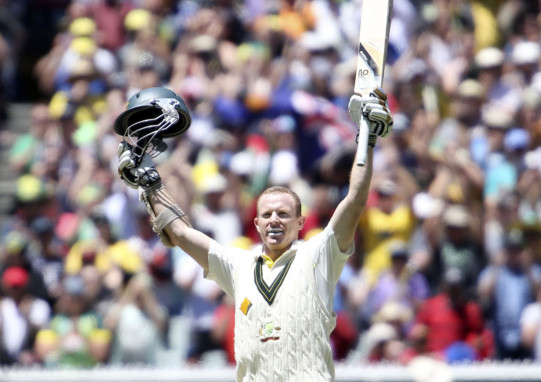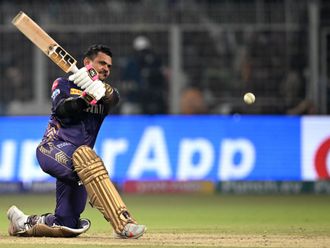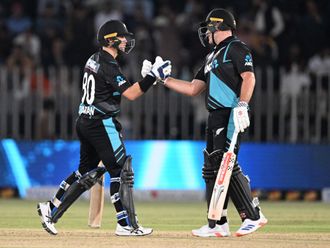
Dubai: When Chris Rogers walked out to bat at Old Trafford, Manchester, on the first day of the third Ashes Test last August, the Australian opener feared his career as a Test batsman was all but over.
Heavy criticism was ringing in his and the team’s ears following their capitulation at Lord’s two weeks earlier, which left the tourists 2-0 down and well on the way to a third successive Ashes series defeat. The worst batting line-up Australia have ever sent, was the general consensus in England after they were rolled over for 128 and 235 at cricket’s spiritual home.
Rogers contributed only 21 runs in his two innings at Lord’s, leaving the veteran left-hander on the brink of being dropped, which would surely have meant his late-career flirt with the Test arena was over. Thankfully for the experienced batsman, David Warner was still being punished for his bar-room swing at England counterpart Joe Root, so he was given a stay of execution for the Old Trafford Test.
The Sydney-born player grabbed his opportunity, defying England’s bowlers for almost three hours for 84 crucial runs. By the time his nemesis Graeme Swann had trapped him lbw half-way through the afternoon session, he had not only saved his place in the team, but also helped lay the foundation for a team score of 527-7 declared that fuelled Aussie confidence for the challenges ahead.
England, aided by the weather, held on for a draw in Manchester and went on to take the series 3-0, but momentum quickly swung Australia’s way and they whitewashed the old enemy 5-0 in the return Ashes campaign just three months later, with Rogers playing a key role at the top of the order.
“After the Lord’s Test, that was probably as low as I’ve been in my cricket career, barring injury,” Rogers told Gulf News in an exclusive phone interview ahead of Australia’s tour to South Africa this month. “To cop that criticism from lots of people I respect was tough.
“People were saying our batting was disgraceful. We batted particularly badly that game and probably let ourselves down. It was hard to take a lot of that because we were all trying as hard as we could — it wasn’t as if we didn’t care.
“The challenge after that was to really bounce back and, from a personal point of view, it was nice to be almost the guy who took on that responsibility and get a few runs in the next Test. I thought that, if it was going to be my last Test, then to just enjoy it and take a more positive attitude into it. Fortunately that worked out well.”
Rogers tends to be understated both on and off the pitch. His batting comes with very few frills, little flair, certainly compared to his opening partner, Warner, with whom he struck up a fine understanding during the steamrollering of England in Australia. The 36-year-old, who averages 50 in a First Class career that has stretched more than 15 years, was far removed from the unseemly sledging that occasionally threatened to boil over — instead, his determination to make the most of his ability won admirers on both sides of the Ashes divide.
There was certainly no hint of ego or one-upmanship as he recalled his and Australia’s successes of the last two months while watching the South Australia 2nd XI team — to which he had been seconded by Cricket Australia to keep his eye in ahead of South Africa — against New South Wales, only breaking off from our conversation to offer an “oh, good catch” as the action continued on the field.
“It was a bit of a rollercoaster,” he said of his whirlwind last nine months or so, which saw him elevated from stalwart English county opener to century-making Ashes winner. After recalling the dark days of the Lord’s Test, he added: “But then equally to have the highs of the 5-0 and the things that go with it, that’s as good as it gets. It’s almost great to have the lows so you can appreciate the highs.”
While the results in the home-and-away battles with England were drastically different, Rogers doesn’t believe much changed in the Australian dressing room between the two series, only that Australia found their renowned ruthless streak.
“I don’t think there was a lot of difference. There was a pretty good feeling amongst us [in England]. We thought we weren’t far off winning a few games, we just couldn’t quite get over the line and that was probably the difference,” he said.
“Once we won in Brisbane [the first Test in Australia], we had that real belief that we could win and win well. Once that came into our side, we almost transformed and played some really good cricket.”
And of England’s rapid decline, which saw mainstays such as Jonathan Trott, Graeme Swann and Matt Prior return home early or be dropped, Rogers added: “Knowing how good individually they all are, yes they underperformed, so you could say that was a little bit of a surprise. But then we played such good cricket that we didn’t let them perform. The way we went about things, it would have been hard for them to play well.”
Even if Rogers, whose sole Test before last summer produced a pair of failures against India at Perth in 2008, fails in South Africa and quickly makes way for a younger rival, his career now has a sheen that for a long time he thought would never come. His high-profile successes — including back-to-back Ashes centuries in Melbourne and Sydney — will always give him something to look back on with fondnes.
“It [returning to the Australia team] would have been nice to have come earlier — physically I would have been able to cope with things a bit better. But it’s better late than never,” he said. “I guess I always would have looked back at my career and thought ‘what if’ if I didn’t get the opportunity to play more than one Test match. Now I can be quite proud about mixing it with the best and doing okay. It’s a nice feeling.”
He owes much of that satisfaction to that vital Old Trafford innings. Rarely can 84 runs have gone so far to saving a career.












